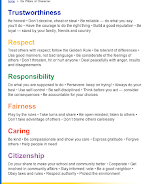

STUDENT EXPECTATION: Address business applications of emerging technologies. Students incorporate a broad base of knowledge of ethical impacts in business to make appropriate business decisions.
1. Learn2type- 10 minutes
2. Finish pages 3-4 in your black folder. Analyzing Websites, this was the 1st two pages. Finish pages 3-4. Start this weeks assignment when you are done. As there are a few of you that have finished all of the worksheet pages Friday. (At least 2 pages in length)
2b- DISCUSSION ABOUT THIS WEEKS ASSIGNMENT-
- Find each of the unethical practices that have happened in a given business, government, university, etc.
- Explain the unethical situation-EX: T-Mobile -Fraud
- Use Word & screenshot as you did Friday for you essay.
THIS WEEKS ASSIGNMENT POSTED BY FRIDAY!!Research the following information
Define and Identify unethical practices: --
(1)hacking, (2) phone fraud,(3) on-line piracy, and (4) data vandalism; & (5) explain why these practices are not acceptable in the workforce. Post your finding by Friday to your blog.
Ethical and Legal Standards for Network and Telecommuncation - Unethical Practices
Hacking
What is a hacker? Not one definition fits all hackers, of course. Most agree, however, that a hacker is one who attempts to gain access to remote computers in order to show that, if nothing else, they can. True hackers don't intentionally damage data, hackers themselves usually claim. True hackers refer to those types of individuals as "crackers". Most hackers believe that it is not unethical to gain access to computer systems, use idle computer communications resources, and download system files for the purpose of self education. Hacking is good, they claim, because it exposes design flaws and security deficiencies within the systems and software they invade. Most also are of the opinion that data should be free and available to anyone, anywhere, anytime. The news media often portray hackers as a malicious loner who wrecks as much havoc as possible on every network they penetrate. There are those who are exactly as portrayed in the media, to be sure. However, many follow the belief that their curiosity is not a crime, and say they don't use their skills for illegal means. They back this claim by pointing out that they accept no money for what they do.
Hackers have existed nearly as long as computers have. Most believe that hacking began soon after students were allotted time on a university mainframe computer. Some soon realized that there was a tremendous amount of computing power and time going to waste, especially during the late night hours. As they hacked, some became exceptionally skilled. They began accessing remote computers of all kinds all over the world. Some gained access for the thrill of it and did no damage to the computers data. Others damaged significant amounts of data, and left prank messages for system users. Some even used remote systems to attack other sites and then cover their tracks.
In December, 1989, Harpers Magazine hosted an electronic forum to discuss the legality of computer hacking. John Perry Barlow, a lyricist for the band "Grateful Dead," and a hacker, who used the alias "Phiber Optik," became engaged in a debate in which Mr. Barlow referred to hackers as "an offbreed of skateboarders". Phiber Optik became upset and left the forum for about ten minutes. When he returned, he posted a complete listing of Mr. Barlow's credit history, which Barlow exclaimed unnerved him more than nearly anything else he had ever experienced.
The potential of hackers is a major concern to governments around the globe. Military personnel responsible for data security must be very concerned that hackers have the ability to manipulate telephone company switches to disguise their whereabouts. This could be an obvious advantage during wartime, or a terrorist attack. Phone lines can also be manipulated to divert calls to competitors or eavesdropped upon. A tremendous advantage could be gained by knowing your competitors economic situation, market strategies, or research findings.


No comments:
Post a Comment